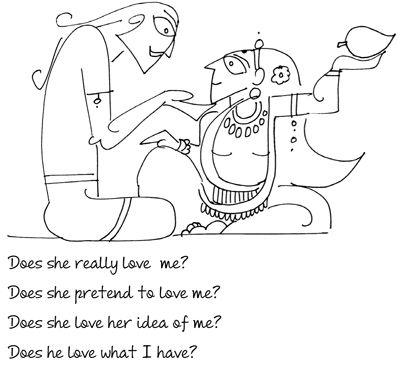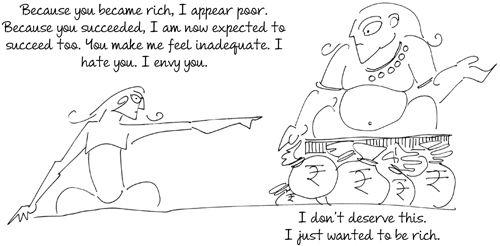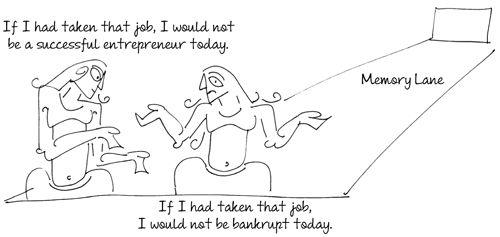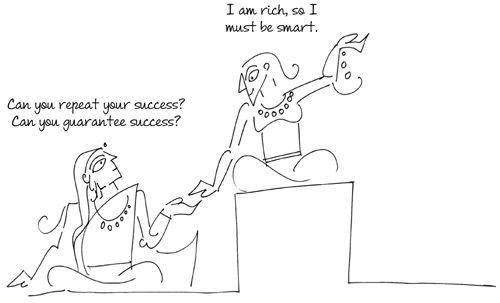Business Sutra: A Very Indian Approach to Management (19 page)
Read Business Sutra: A Very Indian Approach to Management Online
Authors: Devdutt Pattanaik

Not everyone can handle the burden of uncertainty
One day, Bhartrihari receives a jewel from a traveller who is visiting his kingdom. "Only a king such as you is worthy of possessing it," says the traveller.
That night, the king gives the jewel to his beloved queen because he feels she is more worthy of it.
The next day, to his great surprise, he finds the same jewel in a basket full of dung being carried by the lady who cleans the stables.
On being questioned, the cleaning lady says it has been given to her by her lover, the man who grooms the royal horses. When the groom is accused of theft, he reveals it is a gift from a nymph who visits him every night in the stables. The king decides to investigate.
The following night, Bhartrihari hides in the stables and realizes that the 'nymph' is none other than his beloved queen! Blinded by love, he does not see that his wife loves another man and she does not see that the man she finds attractive cares for another woman.
After this incident, the king is unable to take any decisions. He doubts everything he sees. Uncertainty paralyzes him. He trusts no one. In despair, he decides to become a hermit and give up his throne to his younger brother, Vikramaditya.
Bhartrihari has to confront the horror of human existence. We can never know everything and we can never be sure. All information is incomplete, and all readings distorted by personal prejudice. And yet we have to take decisions all the time and hope the results favour us. Bhartrihari feels powerless. He is unable to conduct the yagna and passes on the reins of his kingdom to his younger brother, Vikramaditya.
While everyone has the potential of being a karta or a yajaman, not everyone is willing to take decisions and be responsible for the outcome. We would rather be devata (reactive) than yajaman (proactive).
Madhukar, head of marketing, recommends that Arshiya be made the head of corporate communications. Soon after her promotion, Arshiya begins to behave very differently. She becomes more arrogant and imperious. She is no longer as gentle or as kind. Madhukar realizes that as long as Arshiya reported to him, she behaved very nicely. Now that she reports directly to the managing director, she is not obliged to be nice. Madhukar realizes that the data on the basis of which he made the recommendation was false. He decides to never again recommend anyone for a job or promotion. Ergo, he will never be a yajaman again.

Every decision has a consequence
In the Ramayan, Dashrath shoots an arrow in the direction of a sound that he believes to be the sound of deer drinking water. It turns out to be the sound of water being collected in a pot. The arrow fatally injures the young man who was fetching the water. The young man is Shravan. His old and blind parents do not see this event as an accident. They see it as murder. They curse Dashrath to, like them, die of heartbreak following separation from his son.
In the Mahabharat, Pandu shoots an arrow at a deer, not realizing that it is copulating with a doe, and that it is, in fact, no deer but a sage called Kindama who has taken the form of a deer, along with his wife, in order to mate in the open air. Kindama curses Pandu that should he touch a woman and try to have sex with her, he will die instantly. As a result, Pandu cannot father children. He feels he is unfit to be king as he will never father an heir. So he renounces the throne and stays in the jungle, choosing to be a hermit, a decision that takes everyone in the palace by surprise.
The notion of karma is unique to Indian thought. No action exists in isolation. Every decision impacts the ecosystem. Karma is often mistaken for the adage, "As you sow, so shall you reap." The assumption then is that if we sow good deeds, we will reap good rewards. But who decides what action is good or bad? The desire to qualify an action, and its consequence, as good or bad, right or wrong, is a peculiarly human trait. Nature does not do so.
Action impacts the self, the people around and the environment at large. Every person is impacted at three levels: the physical level, the mental level and the social level. Thus, a tiny ripple can result in a storm, and the ripple-causer needs to take responsibility for it.
An arrow that has been released from the bow is a metaphor for a decision that cannot be withdrawn. It has consequences that a yajaman has to face. There is no escape. This is a heavy burden to bear.

For years, they manufactured automobile parts. But when Ritwik decides they should open service centres for luxury cars, the whole family opposes him. "Do it with your own money!" his brother says. So Ritwik uses his own money and investments. If he succeeds, the profits are his alone. He will prove once and for all that he is smarter than the rest of his family. If he fails, he will have to face the double humiliation of being a business failure and being told by his family, "We told you so." If Ritwik chooses to listen to his family, he will have to spend the rest of his life wondering about all the things that could have happened if only he had had the guts to take a risk. There is no escape from consequences.
Decisions are good or bad only in hindsight
Garud, the eagle, is enjoying the song of a sparrow atop Mount Kailas when he observes Yama, the god of death, also looking at the bird. But Yama is frowning. Maybe he does not like the song. Fearing for the welfare of the little bird, Garud, with compassion in his heart, decides to take the bird away from Yama's line of sight.
Garud takes the bird in the palm of his hand and flies to a forest far away, beyond the seven mountains and seven rivers. There, he leaves the sparrow on a tree full of succulent fruits. When he returns to Mount Kailas, he finds Yama smiling. Yama explains, "My account books are balanced. I saw a sparrow here singing a song. It is supposed to die today but not here. It is supposed to die in a forest far beyond the seven mountains and seven rivers, eaten by a python that lives under a tree full of succulent fruits. This has happened, thanks to you, Garud."
Garud realizes in hindsight that what he thought was an act of kindness turned out to be an act of cruelty for the sparrow.
When strategies are made it is in the hope that they will minimize surprises. Huge amounts of time are taken to ensure the data and, the analysis is right so that the results are predictable. As organizations grow larger, the cost of mistakes is higher, and so much more time and energy is taken while taking decisions. And yet, despite all precautions, things can and do go wrong, often because assumptions are incorrect. A yajaman needs to take this in his stride.
A yajaman needs to be defined not by the outcome, achievement, goal or performance, but by his ability to take decisions proactively and responsibly.
It seemed like the right thing to do at the time: leaving the job and starting out on his own. Parul thought that the clients would love to have the same work done at a lower cost by a freelance consultant. But when she started visiting clients she realized there were more freelance consultants than she had anticipated. The competition was fierce. So she started offering outsourcing services. And suddenly, she found herself much in demand and the owner of a thriving business. Her husband said that resigning from the consulting firm was the best thing she had done. But Parul knows that she left to be a consultant and had never dreamed she would become an entrepreneur. This was not a future she had planned or anyone had predicted. She is not sure if what has happened is good or bad.

Decisions are often rationalized in hindsight
In the battlefield of Kurukshetra, when Bhisma sees Shikhandi standing on Krishna's chariot, he lowers his bow. Taking advantage of this, Arjun who is standing behind Shikhandi lets loose a volley of arrows that pins Bhisma to the ground. Even though the great general of the Kaurav army cannot be killed, Arjun has managed to incapacitate him, increasing the chances of Pandav victory.
The Kauravs protest: the rules were breached, Shikhandi was a woman and no woman is allowed on the battlefield.
The Pandavs insist Shikhandi is a man: he was born with a female body but later in life, due to the intervention of a yaksha called Sthuna, had obtained male genitalia. Does that make Shikhandi a man or a woman? Is Bhisma wrong to assume Shikhandi is a woman? Is Arjun right to assume Shikhandi is a man? Since the outcome benefits the Pandavs, we can say Arjun's call is right, but the answer is anything but objective.
At the time of action, our decision is based on a set of assumptions. The assumptions may be wrong. Leaders have to constantly deal with uncertainty, give hope to the people even when nothing is clear. Decisions become good or bad in hindsight. We would like to believe that a decision is rational. More often than not, decisions are rationalized.
Often in business we take decisions based on how we interpret the situation, not being sure of whether the call we have taken will work or not. When it works, we are often taken by surprise. But the world at large demands an explanation. We are expected to prove that our decisions were strategic, not simply a fluke. To say that a certain victory was a fluke makes us nervous. Corporations reject this. Once the numbers come, the manager has to spend hours creating a story rationalizing his action so that everything looks as if it were part of a pre-conceived plan.

As the head of research and development, Dr. Sulabha prepares various types of snacks that the company then promotes in the market. Some succeed, some do not. Some become very successful. Each time the management asks Dr. Sulabha to give reasons why she feels a particular snack will be very successful and why they should invest in that product's development. She feels there is no one, except maybe a fortune-teller, who could actually give the right answer, but she is compelled to come up with satisfactory logic to comfort the management and ensure she gets funds, and keeps her job. At conferences she is often called to speak about her successful creations and the audience loves it when she tells them how she observed customer behaviour and strategized a product that eventually became a winner. The lectures would not be a hit if she were thanking providence or intuition for her best-selling snacks.